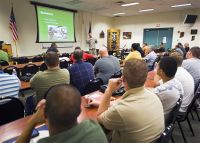WASHINGTON — A training program is equipping Defense Department civilian employees with the knowledge and skills needed to successfully deploy in support of humanitarian, reconstruction and combat-support military missions across the globe.
The joint civilian expeditionary work force training — a 10-day predeployment course held at Camp Atterbury Joint Maneuver Training Center and Muscatatuck Urban Training Center in central Indiana — familiarizes civilians with everything from military culture to cultural sensitivities.
The civilian expeditionary work force was created in January 2009 to provide a deployable work force trained and equipped to support military missions. Under the program, Defense Department civilians – in a wide range of careers ranging from engineers to contract specialists — deploy for about a year to Iraq and Afghanistan, but also serve in some capacity in Europe and Africa, according to the program’s website. More than 4,000 civilian employees currently are deployed in support of operations Enduring Freedom and Iraqi Freedom, officials said.
While civilians have been deploying for some time, the training was developed in January because officials “understood the importance of training our folks before we deployed them,” said Frank DiGiovanni, the Defense Department’s acting director of readiness and training policy and programs.
“I think it’s very important to prepare our civilians in the same way that we prepare our uniformed forces to really understand what they’re going to get to when they get into the theater,” DiGiovanni said in a recent interview with the Pentagon Channel and American Forces Press Service. “Some folks haven’t had the opportunity to work in deployment with a primarily military environment.”
To that end, the course runs the gamut from convoy operations to recognizing the signs of post-traumatic stress, he said.
Civilians are run through scenarios, including what to do in the event of a roadside-bomb or convoy attack, DiGiovanni said, while other training is tailored for specific career fields based on the demographics of each course.
Contracting officers, for instance, may take part in a scenario in which they deal with outside vendors so they know what to expect when they’re deployed. Training officials recently hired Afghan native role players to participate, and students received feedback from the instructors as well as the role players, DiGiovanni said.
“They had to work with an interpreter; they had to take bids from three Afghan people that were going to provide gravel to the base; and then they had to work through some of the issues of a translator, understanding the bids, proposals and maybe some of the cultural issues,” he said.
“It’s extremely important to experience all of these things in a training environment first, before they actually deploy into a theater,” DiGiovanni continued. “This helps them be much more productive and hit the ground running when they finally get into the contingency operation.”
Other training includes physical conditioning and nutrition, use of tactical radios, weapons familiarization and combat first-aid. Students also are given to tools to armor against and to deal with stress.
“We also try to help them with setting up for success with families,” DiGiovanni said, “so they understand … the things they need to do so they can make sure while they’re deployed for a year that their family can be cared for properly.”
Instructors also devote time to teaching civilians to be part of a military team in a deployed environment, he said. They’re taught rank and organizational structure so they’ll understand where they fit into the organization and the chain of command.
When military members walk into the room, they have insignia to signify service branch, and rank, which signifies experience level, he said. But, people can’t tell on first glance a civilian’s experience level or expertise. The course stresses the need for civilians to convey their skills to military members and helps them understand how to win over the confidence of someone in uniform, he explained.
Course instructors are drawn from the civilian sector as well as the military, DiGiovanni said, and both bring value to the table. The military focuses on convoy operations and weapons familiarization, for instance, while civilians may center on training that deals with adaptability and dealing with stress, he explained.
While the course is fairly new, the feedback so far has been positive, DiGiovanni said.
“We have gotten outstanding feedback,” he said. “What we see primarily is confidence levels. We see people who have a better understanding of what they’re about to do.”
Putting forth a skilled, well-trained civilian force frees more military members to focus on more combat-oriented operations, DiGiovanni said, which relieves stress on the force. It also provides the military with unique capabilities that may not be inherent in the uniformed side of the house. And the training gives civilians the opportunity to contribute in a meaningful way, he added.
Source:
U.S. Department of Defense
Office of the Assistant Secretary of Defense (Public Affairs)

 von
von 